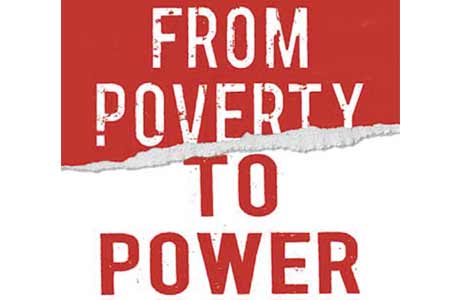From Poverty to Power
Issue 59 August 2009
Author: Duncan Green
Review by Nicholas Piachaud
When we talk about poverty, it’s often easiest to talk about the money. People living on two dollars a day live in poverty (able to scrape together a minimum of food, clothing and shelter); people living on a dollar a day live in extreme poverty (unable to feed themselves). The story is the same when we talk about ending poverty. Globally, if we were prepared to spend just a third of what we spend annually on the military, we could end extreme poverty.
Duncan Green is demanding that we see the bigger picture. The economics of poverty is really just the shadow of something else, of a fundamental disenfranchisement – a “sense of powerlessness, frustration, exhaustion, and exclusion from decision-making” which really characterises poverty. Green, Head of Research at Oxfam GB, has spent 20 years listening to people who have been forced to live in this state. His book tells us that ending poverty means putting real power – economic, social and cultural – into the hands of the millions of people who are living without it. More importantly, he tells us that impoverished people are not sitting idly by and waiting for the rich world to come to their rescue; they are seeking the means to change their lives. To help them, we have to understand that they know what they need better than we do.
They say if you give a man a fish you’ll feed him for a day; if you teach him to fish you’ll feed him for a lifetime. Perhaps that’s what’s wrong with our understanding of development today. The man in question already knows how to fish – after all, his people have probably been doing it for hundreds of years. However, overfishing and polluted waters have shrunk his daily catch, and what he can catch he can’t sell, because the market is flooded with cheap produce – if he does manage to sell anything, he’ll only receive a pittance for it. Green notes that the world’s fisheries generate about 120 billion dollars a year, but 95% of the labour has to manage on $2 a day . However, he also tells the story of the fishing community of Bundelkhand, India, which reclaimed control of vital fishing areas from landlords – a process which included fighting pitched battles against thugs hired to drive the fishing families from their homes. That’s what this book is really about: the story of impoverished people taking control of their own destiny.
The book also has some important lessons for charitable giving: aid, Green argues, is most successful when you listen to the people you are trying to help. Documenting Oxfam’s response to an earthquake in an Indonesian city in 2006, for example, Green notes the organisation’s surprise when the residents explained that their most pressing need was for plastic sandals: the streets were covered with smashed glass and most people hadn’t had time to put on their shoes when they fled in the night. Listening to the people you’re trying to help may seem pretty obvious, but Green details plenty of examples where well-intentioned charity went wrong – including the story of a major port in a disaster zone being blocked by a delivery of unwanted second-hand toys, apparently collected for children affected by the disaster. Green also highlights the media-driven lottery of global aid: the 2004 Asian tsunami raised over $7,000 per person affected, whereas floods that year in Bangladesh raised $3.
We have to see poverty as a consequence of global inequality, which is a beast with many faces. Again, it’s easy to talk about the money. People living in the slums of Nairobi, for example, pay up to ten times more per unit of water than people living in London or New York. Moving away from the economics, however, Green also tells us to look at the exclusion of women – and how women across the world have challenged it. In Morocco, for example, women’s groups successfully pressed the government for a new Islamic Family Code in 2004 that, in Green’s words, ‘radically strengthened the rights of women’ in the country. An activist at the time argued: ‘We maintained that Islam is not opposed to women’s equality and dignity and should not be presented as such.
So what’s the answer to poverty? Well, at heart, Green’s message is pretty simple: by working with states, people really can change the world – and in many cases they already have. Beyond this, though, From Poverty to Power has a number of pretty big economic and social proposals to make which may be controversial. I can imagine that some will disagree with the book’s arguments for radical land and monetary redistribution and for more protection for economies in what we like to call the developing world.
However, there’s also no question that the world is moving beyond the old ideas about development and aid. The Washington Consensus has collapsed. As talk of the free market is silenced by governments scrambling to save the banking system, there is, finally, a chance for the world to listen to what people living in poverty are trying to say.
If only this book could be the start of a long discussion.



Comments
0 Comments